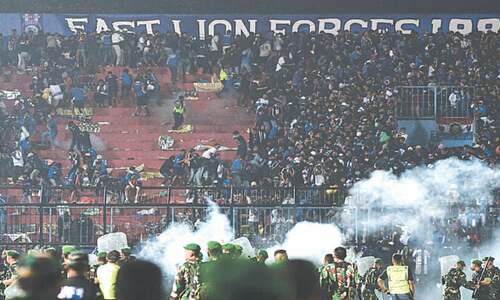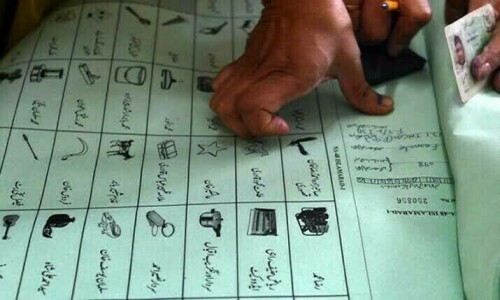
MALANG: Dozens of Indonesian police were placed under investigation on Monday over a stampede at a soccer match that killed 125 people, as authorities sought to determine what caused one of the world’s deadliest stadium disasters and who was to blame.
Nine police were stripped of their positions and the local police chief transferred, police spokesperson Dedi Prasetyo said, adding that 28 officers were under investigation.
The incident in East Java province has sparked outrage and grief in Indonesia, where sports commentators and activists have slammed what they see as an excessive use of force by police, and authorities have pledged to investigate.
Questions are being asked about locked gates at the stadium, which was packed well over capacity, and about holding a match that local football experts had identified as ‘high risk’ due to the bitter rivalry between the two teams.
Several policemen under investigation for ‘excessive use of force’
Indonesia’s chief security minister Mahfud MD has formed an independent fact-finding team to investigate the stampede, while President Joko Widodo has ordered the country’s football association to suspend all games in the top league, known as Liga 1.
What happened at the match
The match between the home team Arema FC and Persebaya Surabaya ended with the former losing 3-2, a huge upset given that Arema had not lost a home game to Persebaya in 23 years, according to police and a local soccer expert.
The outcome angered many in the crowd, which consisted almost entirely of Arema supporters after the police had banned Persebaya supporters from attending for fear of violent clashes.
Agitated Arema FC fans streamed onto the pitch after the match to vent their frustration, prompting clashes with police, who fired tear gas to try and disperse them.
The tear gas sent waves of panic through the crowds, with many caught up in a deadly crush as they tried to escape. The severity of the disaster was due to a confluence of factors, including a venue packed beyond capacity, poor safety planning, and a lack of communication among organisers and police.
While the stadium in Malang has several exit gates, spectators told Reuters that some of these were locked during Saturday’s match, causing bottlenecks and chaos as fans tried to flee. Police at the stadium are also facing scrutiny for using tear gas, banned by world soccer governing body, FIFA.
FIFA has requested a report on the incident, which it described as a “dark day for all involved”.
There are also growing calls for the police and football organisations to formulate ways to work more closely to prevent similar disasters in future.
First match at the stadium
The scale of Saturday’s disaster has left the small Java community numb.
“My family and I didn’t think it would turn out like this,” said Endah Wahyuni, the elder sister of two boys, Ahmad Cahyo, 15, and Muhammad Farel, 14, who died after being caught in the melee at what was their first live match.
“They loved soccer, but never watched Arema live at Kanjuruhan stadium,” she said.
The Koran Tempo newspaper ran a black front page on Monday, centred on the words “Our Football Tragedy” printed in red along with a list of the dead.
A tearful Arema FC president Gilang Widya Pramana apologised to the victims on Monday and said he was ready to take full responsibility.
Security minister Mahfud said victims’ families would receive 50m rupiah (around $3,300) in compensation and treatment for hundreds more injured would be free.
On Sunday, he said the crowd was beyond capacity, with 42,000 tickets sold for a match in an arena designed to hold 38,000. Authorities said, however, that tickets had not been issued to Persebaya fans over security concerns.
Worst sporting disasters
Indonesia has a history of violence and football hooliganism, especially in major urban centres such as Jakarta, but the scale of this incident is unprecedented, ranking among the worst globally in recent decades.
In 1964, 328 people were killed when Peru hosted Argentina at the Estadio Nacional in Lima, while in the late 1980s, 96 Liverpool supporters were crushed to death when an overcrowded and fenced-in enclosure collapsed at the Hillsborough Stadium in Sheffield.
Published in Dawn, October 4th, 2022













































